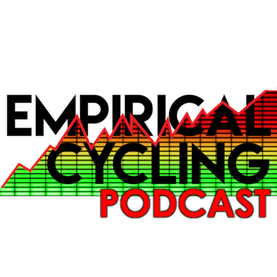|
Podcast merch!
Listen and subscribe: RSS FEED ITUNES Soundcloud Stitcher Spotify If the episodes below don't load, turn off your ad blocker. |
|
This episode is the focal point of the previous VO2max episodes. We take the physiology from the previous episodes and use it to find easy ways to improve the effectiveness of any VO2max interval set. Ways to change your cadence, interval times, rest times, and interval intensities are discussed. Then we take apart a Ronnestad study on 30/15s and put it in context of VO2max and other fitness adaptations. We conclude with a training philosophy discussion on the physiology of true long term VO2max improvements.
Show Notes Haematological rather than skeletal muscle adaptations contribute to the increase in peak oxygen uptake induced by moderate endurance training https://pubmed.ncbi.nlm.nih.gov/26282186/ Cycling cadence alters exercise hemodynamics https://pubmed.ncbi.nlm.nih.gov/8775571/ Superior performance improvements in elite cyclists following short-interval vs effort-matched long-interval training https://pubmed.ncbi.nlm.nih.gov/31977120/
9 Comments
Dave Krenik
7/22/2020 07:43:35 pm
Great episode - thanks. I appreciate y'all showing the "application" aspect after the VO2max theory.
Reply
Kolie
7/22/2020 07:51:52 pm
You're exactly right. It can indeed be unstructured!
Reply
Lenn
7/25/2020 05:56:09 pm
Hi, thanks for this great insight!
Reply
Kolie
7/25/2020 07:19:54 pm
Hi Lenn, this is a good one. I'm going to add it to the listener questions episode, which should be coming out early to mid next week.
Reply
Tom Field
7/26/2020 09:26:38 pm
I have to say that the first thing that came to mind regarding increasing preload chronically, is that I wonder if it would lead to right heart dilitation and subsequent arrythmias
Reply
Kolie
7/27/2020 11:21:46 am
I'm not a doctor so I can't speak to anything on this subject with any authority, but my impression from reading the literature is that chronic overload without a recovery period, such as in hypertension can lead to maladaptive hypertrophy. Many of the papers I read made distinctions between athletic, adaptive hypertrophy and pathological hypertrophy.
Reply
Kevin
7/28/2020 02:39:36 am
Thanks for some interesting episodes. I understand the rationale behind the approach, but does training a these higher cadences with consequent lower power output translate to more power at realistic cadences? After all we pedal with our legs, not our ventricles!
Reply
Pierre
7/29/2020 09:55:16 am
Hi Kolie,
Reply
Kolie Moore
8/3/2020 09:58:28 am
Hi Pierre!
Reply
Your comment will be posted after it is approved.
Leave a Reply. |
Archives
July 2024
Categories
All
|


 RSS Feed
RSS Feed